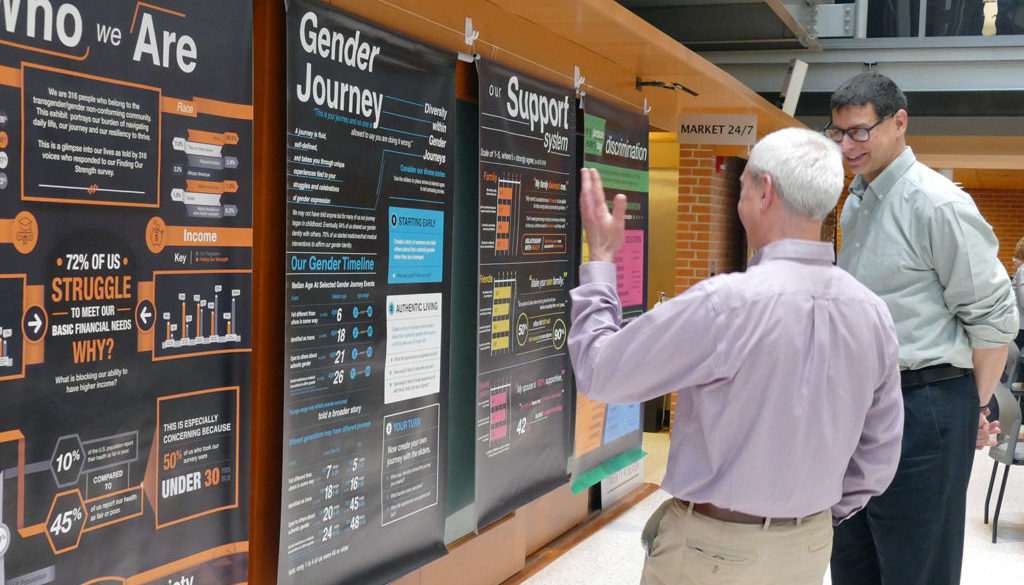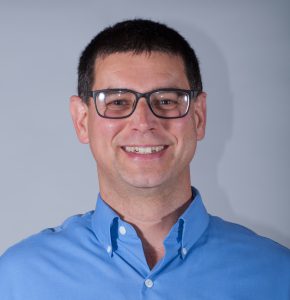Finding our Strength: Transcending the Binary
November 25, 2019

ANN ARBOR – This year, ISR hosted a pop-up exhibit displaying findings from a survey led by Transcend the Binary, an advocacy organization for the transgender/gender non-conforming (trans) community in the Metro Detroit area. Transcend’s goal is to create awareness about trans lives, generate new perspectives that can translate into greater individual and community resiliency, and stimulate public conversations that foster an environment that affirms the trans community.

Peter Batra
Peter Batra, a senior survey specialist at the Survey Research Operations (SRO) unit of the Survey Research Center (SRC) in ISR works as a research partner with Transcend the Binary, and helped facilitate and analyze the data from the survey.
Specifically, the Finding our Strength survey gathered information about:
- Worry about discrimination associated with personal and social situations, workplaces, schooling and healthcare settings
- Actions taken to cope with discrimination including the gender journey chosen
- The perceived effectiveness of coping actions taken
- Respondent demographic characteristics, health status, and social support
A major survey finding was the high percentage of participants that reported anxiety. Using the General Anxiety Disorder-7 scale, four of five respondents reported some degree of anxiety with over 30% reporting severe anxiety. “This level of anxiety is higher than that reported in the literature, but was felt to be a valid finding by our local TGNC community,” said Caitlin Tupper, LCSW, of Transcend.
“Among our respondents higher anxiety was associated with less family support, lower self-reported health status and coping through avoidance or social isolation.”
Batra was recently interviewed by the Interdisciplinary Association for Population Health Science (IAHPS) about his involvement with this innovative collaborative organization and community-engaged research.
IAPHS: Can you tell us about how you got involved in working with Transcend the Binary?
PB: I got into this research almost by accident. One of the founding research team members asked if I would be interested in doing analysis of a transgender survey. Initially this was pitched as a opportunity with a maximum of six months involvement. I was between jobs, and said “Yes!” and now I’ve now been working with my research colleagues for almost 3 years. I knew nothing of this topic before I started, but once I started looking at the data, meeting with the team, and learning from transgender and gender nonconforming (TGNC) community members, I have been keen to continue this important work.
Our team consists of Brayden Misiolek, one of the co-founders of Transcend the Binary; Nancy Lewis, a pharmacist/researcher who works with the TGNC community; Caitlin Tupper, a clinical social worker; and Stu Rockafellow, a clinical pharmacist. We all volunteer on this project and have “day” jobs, but our team has become passionate about this topic and excited that our research has received positive encouragement when we have presented it.
IAPHS: What kinds of topics were addressed in the Finding Our Strength survey
PB: The TGNC community faces challenges with things that cisgender folks take for granted. Imagine if you had to constantly worry about how you looked or about people’s reactions to your use of a public bathroom. Many TGNC people navigate this kind of challenge daily in many aspects of public life, but also in their access to health care services and other resources important for health. There has been very limited data on the experiences of this community to these kinds of daily challenges.
Moreover, these pressures generate a tremendous amount of anxiety, which when bottled up inside can lead to unhealthy habits as a means of coping. Also, imagine constantly being on alert – in a state of fight or flight. Not only does this heightened awareness distract from your everyday tasks and interpersonal relationships, it raises and keeps cortisol levels elevated for extended periods of time. We know from other studies that high cortisol levels result in health issues – similar to those seen in cases where people live with constant emotional abuse and/or live in a state of fear.
IAPHS: Do you have advice about collecting and sharing data in a rigorous, inclusive, and gender-affirming way?
PB: What we continue to find in our approach to community-based research is that by involving community members from the beginning, we are able to not only gain their trust and put them at ease, but we can dig deeper into the root issues that they are facing. I recently attended a talk by a researcher studying the Gullah community in South Carolina. The researcher spent hours gaining the community’s trust, perhaps because this group had been “researched” before and it was not a good experience for them. Vulnerable populations have legitimate concerns about researchers “swooping in with their funding to study them like bacteria in a petri dish.” And then leaving.
Our approach has been to work with TGNC community members from the beginning to the end. Finding our Strength was an online survey of U.S. self-identified transgender/gender nonconforming (trans) adults 18 years and older. Trans community leadership guided survey objectives, content, format, and design. Input was received through individual conversations with trans community leaders and members, a focus group, and two pilot testing phases. Input identified community concerns and salient and important topic areas, enhanced understanding of the information that the trans community felt comfortable sharing, and honed in on questions and response options that were gender affirming and non-offensive to the majority.
At a recent presentation at the University of Michigan’s Institute for Social Research, we were asked about making our data available to the Inter-University Consortium for Political and Social Research (ICPSR) repository. While we would eventually like to make anonymized data available, we are still debating how this may affect the community who shared their data with us. Of course, as researchers we would like for others to have this data – and for others to add to the analysis of it – but it’s something we are struggling with. I think our struggle is that we believe the community must be involved in the analysis and the data interpretation and that the findings should be used to foster results, not just papers! So how would we ensure that others would do this? It’s an issue for all community research partnerships.
IAPHS: What are your next steps in this work?
PB: On behalf of our research team, I recently submitted a proposal for a small grant to extend some of the work we have done thus far. We noticed that very few African Americans or Latinos participated in our survey, and our proposal for this grant is to fund one-on-one meetings and focus groups to elicit how we may encourage future participation of these members of the TGNC community. We will partner with a local LGBTQ organization based in Ferndale, Michigan. I think this will ultimately lead us to conducting another survey that will expand on what we learned with the 2016 survey, while also repeating our core variables 4 or 5 years later to assess how changes in the social landscape may be affecting the community.
(Read the full Finding our Strength survey results, which a detailed literature review to situate the study, details about the survey design, and detailed results.)
More Information:
Finding Our Strengths Survey 2017
Contact:
ISR Communications Team, [email protected]
